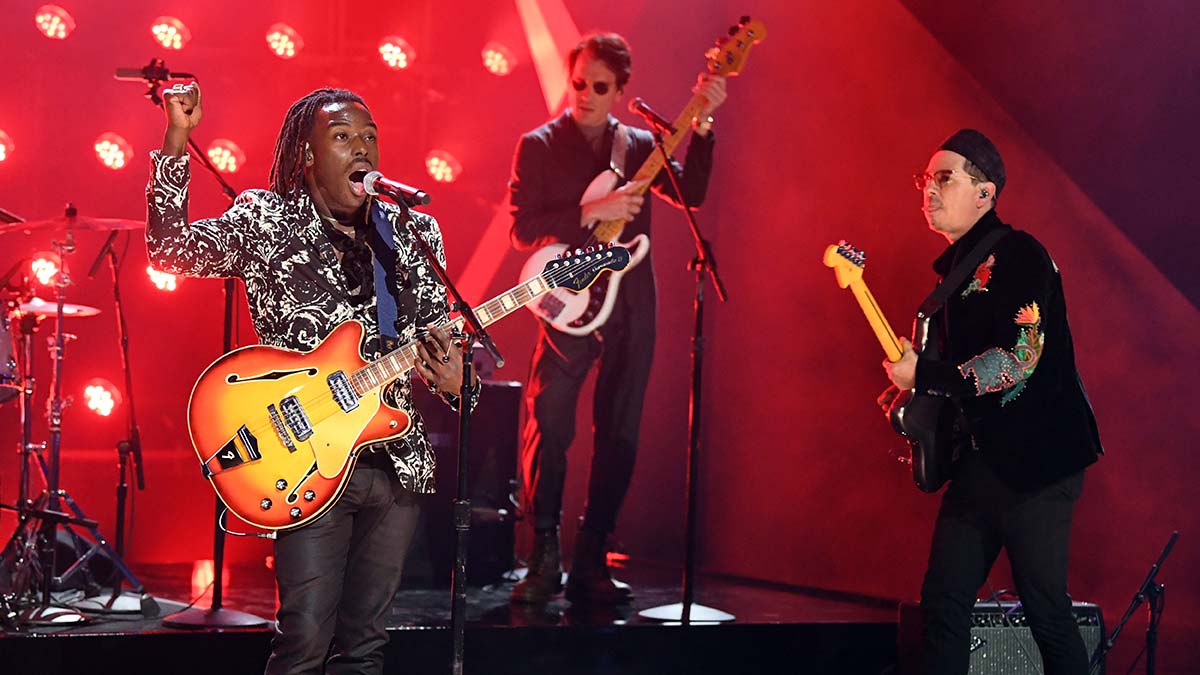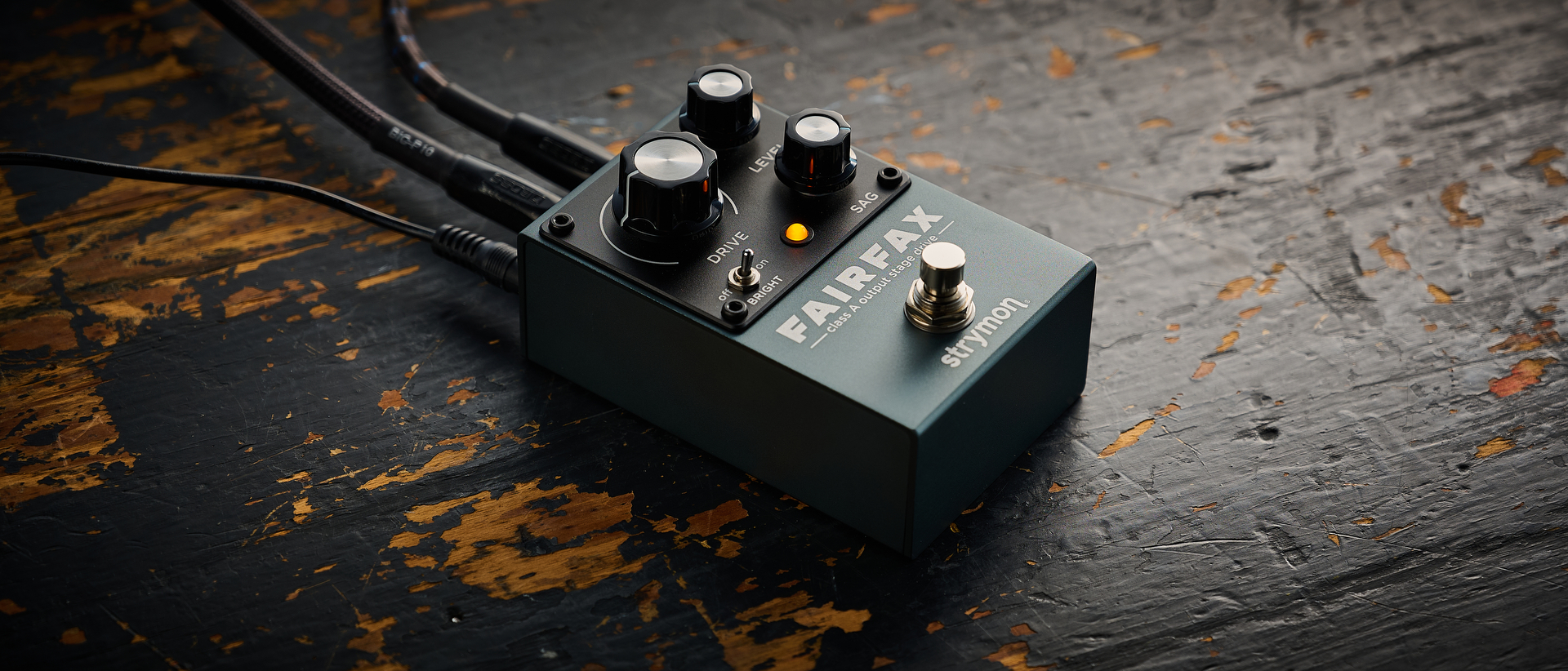Black Pumas’ Eric Burton and Adrian Queseda on how two “rhythm players“ found an unintentionally retro sound
Burton and Queseda are looking to the future with album number two, where a Mobb Deep track may have as much influence as a Stax classic

All the latest guitar news, interviews, lessons, reviews, deals and more, direct to your inbox!
You are now subscribed
Your newsletter sign-up was successful
The 2021 Grammy Awards ceremony, which took place in L.A. back in March, was, like everything over the past year, an atypical production that only vaguely resembled its non-pandemic past.
That said, the show still managed to kick off with a one-two punch of performances from very Grammy-like artists – pop phenoms Harry Styles and Billie Eilish.
Also on the shared stage that night? The Black Pumas, who were up for three awards, including Album of the Year for the deluxe edition of their self-titled 2019 debut, and who brought a bit of retro-soul flavor – and a much-needed guitar-forward jam – to the stage with a searing performance of Colors (that song, by the way, garnered the group’s two additional nominations, for Record of the Year and Best American Roots Performance).
Black Pumas, which is built around the duo of singer and guitarist Eric Burton and guitarist and producer Adrian Quesada, stood out from most of the other fare (pop-rock trio Haim excepting) on the show that evening – as did their companions, a 1967 Fender Coronado for Burton and a newer Fender Jaguar for Quesada that “sounded so cool with the fuzz pedal I was using,” he says. “And I tried it on with my wardrobe and it looked cool, too. So, done deal.”
That said, they did feel a kinship with their fellow musicians. “Everyone was definitely showing love,” Quesada continues. “Harry [Styles] actually came up to tell us that he really liked our record. So, kind of a cool moment having artists supporting other artists.”
Adds Burton, “It was nice to perform on the same stage as some of our peers who are doing very well and representing their genres with great gusto.”
Black Pumas, it’s worth noting, have likewise been representing their own genre with great gusto. “We’re making music from our hearts, and thankfully that’s resonated in other people’s hearts as well,” Burton says. But how they arrived here is unlike the road traveled by most bands.
All the latest guitar news, interviews, lessons, reviews, deals and more, direct to your inbox!
In a story that has now been told and retold (it’s a good story), Burton, who grew up in Southern California singing in church and involved in musical theater, and with minimal exposure to secular music, cut his teeth busking at the Santa Monica Pier, developing his singing and guitar playing – and his performance chops – for crumpled-up dollar bills from passers-by.
Eventually, he road-tripped up and down the West Coast with some musician friends before landing, and staying, in Austin, Texas. Which is where he met Quesada, who, 13 years his senior, had grown up on hip-hop and hair metal, spent time in a local punk-jazz band and logged more than a dozen years with Grammy Award-winning Latin funk “orchestra” Grupo Fantasma.
During those years, Quesada had the opportunity to play alongside Prince (“His lead guitar chops were, like, through the roof,” he recalls. “It was pretty intimidating”) and also took part in a Grupo side project, Brownout, which recorded a series of Black Sabbath covers under the name Brown Sabbath and played them, at one point, for Ozzy Osbourne himself.
“We ended up getting booked for festivals, and we did a private show for Ozzy and [his son] Jack. The whole thing took on a life of its own.”
By 2017, Quesada had departed Grupo Fantasma and was looking for a singer to add vocals to some new instrumentals he was brewing up in the studio. At the suggestion of a mutual friend, he rang Burton, a virtual unknown in Austin – or anywhere else, for that matter. The pairing proved prophetic.
“Eric fit like a glove on those instrumental tracks,” Quesada recalls. “And then he started showing me his songs that predated us even knowing each other, it was like, ‘Oh, shit, this fits perfectly with this sound I’m producing…’ ”
One of the songs Burton had in his pocket was Colors, which, Quesada says, “Eric wrote over 10 years ago. But it’s still touching that place in people’s hearts all these years later, on different levels.”
Indeed, Colors, with its swelling, almost hymn-like melody and socially minded lyrics (“All my favorite colors / My sisters and my brothers / See ’em like no other,” Burton intones in a honeyed, emotive voice) has, like much of the material on Black Pumas, led to the band being tagged with a retro-soul label.
One day we’ll be really geeking out on an old soul song, and the next day we’ll be geeking out on a Mobb Deep track
But there’s more to it than that. “We’ve never really set out to make retro music,” Quesada says. And while he admits he and Burton “probably listen to more older music than we do newer music,” he also says their sound “kind of lands somewhere in between. One day we’ll be really geeking out on an old soul song, and the next day we’ll be geeking out on a Mobb Deep track. And then the next day we’re on to some rock ’n’ roll. It’s all over the place.”
Guitar-wise, Burton characterizes himself and Quesada as “rhythm players at heart.” Though it is Quesada who handles the brunt of the lead work and single-note melody lines.
“I love lead guitar and I love solos,” Quesada says, “and I’ve been playing so long that there’s a certain amount of muscle memory that goes on.” But, he adds, “and I would shout this from the rooftops, Eric’s a dope-ass guitar player, man. There’s some stuff on the record that I think people have assumed is me on guitar, but I’m like, ‘No way – that’s the hands of Eric Burton.’ I like people that play interestingly and uniquely, and Eric’s one of those guys.”
Regarding his approach, Burton says, “When I first started out on guitar, it was like straight-up troubadour style by myself, where I’m beating on the guitar to show some percussion, playing the bass notes, doing the minor leading tones within the rhythms. So with my guitar playing as unorthodox as it is, coupled with Adrian’s sensibilities, we have an interesting dance that we do together.”
Burton and Quesada are embarking on that interesting dance in pursuit of crafting the follow-up to Black Pumas. But word is still out on when the new material will be released, or what it will sound like.
“We have over 20 ideas that are in various stages of completion,” Burton says. “Some that started on acoustic, some that started on electric, some that started on keys. We respect each other musically, so we have the ability to follow each other into places we’re not familiar with, so to speak, with soul being a bit of a lighthouse.”
Quesada concurs. “I don’t ever remember any moments where Eric had shown me a song and I’ve been like, ‘Oh, man, I don’t hear it…’ My wheels always start turning immediately – ‘I could do this.’ I could do that.’ There’s synergy between us. And it’s been that way from the beginning.”
- Black Pumas is out now via ATO Records.
Rich is the co-author of the best-selling Nöthin' But a Good Time: The Uncensored History of the '80s Hard Rock Explosion. He is also a recording and performing musician, and a former editor of Guitar World magazine and executive editor of Guitar Aficionado magazine. He has authored several additional books, among them Kurt Cobain: Montage of Heck, the companion to the documentary of the same name.

